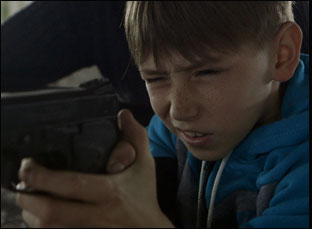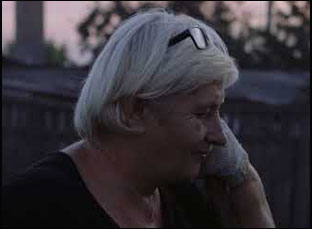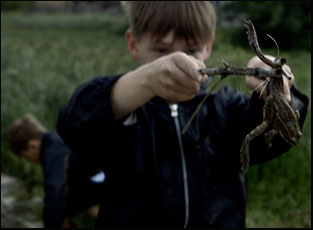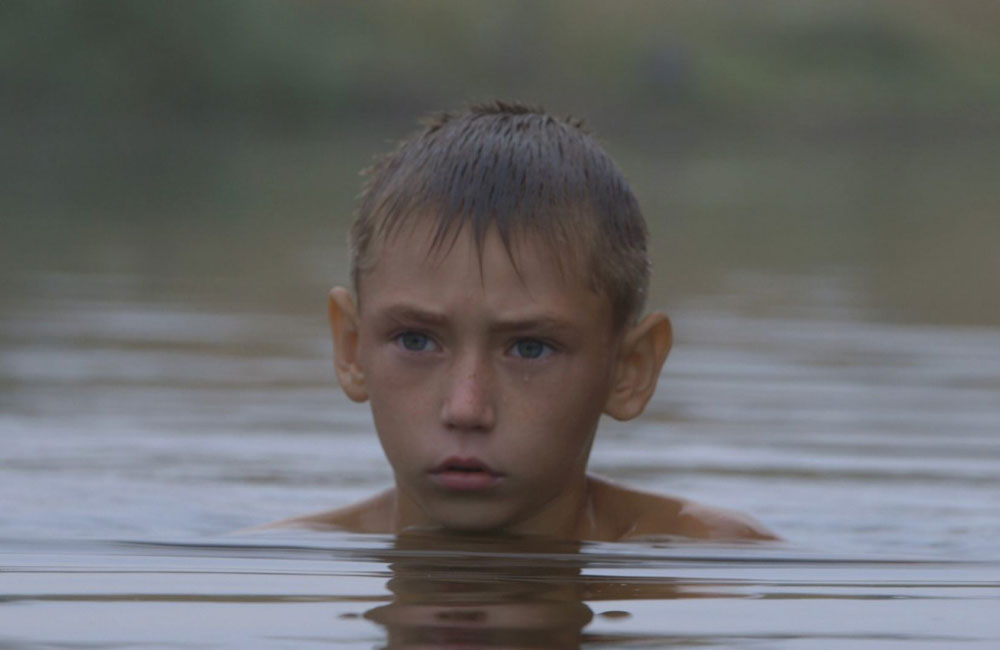Since becoming a filmmaker, Simon Lereng Wilmont has scoured the world for stories of children formulating some sense of identity as they overcame an early challenge, whether it was in Egypt where he tracked a young boy named Mahmoud as he learned to be an acrobat in “Above the Ground, Beneath the Sky,” his native Denmark where he followed a fencing prodigy for “The Fencing Champion,” or Japan where he sought out the son of a sumo wrestler aiming to follow in the footsteps of his father in “Chikara.” The short films were aspirational, with the young boys all having the freedom to pursue their dreams from a young age, which led Wilmont to wonder about those who were deprived such opportunity and couldn’t imagine what the next day would be like, let alone the next few decades. As a result, he began looking into war zones, attempting to learn of how a child without such stability finds their footing, and he was led to the village of Hnutove in Eastern Ukraine, ravaged by bombing since Russian separatists invaded the country in 2014.
Wilmont’s breathtaking “The Distant Barking of Dogs” may be immediately striking for the risks the filmmaker took to capture it as he becomes a fly on the wall in the modest home of a 10-year-old named Oleg and his grandmother Alexandra, who isn’t budging from the property well after her neighbors have largely fled for safer pastures. Yet the question of how Wilmont evaded danger becomes secondary to how he was able to depict with such emotional precision just how the burden of war has begun to shape both Oleg and Alexandra, even though it exists as a largely unseen force in their lives. Over the course of a year, Wilmont impresses upon an audience what the two of them have felt throughout the ongoing strife, judiciously parsing out telling moments about the loneliness of such a solitary existence and struggling to make sense of a war they had no part in instigating as their house trembles when mortar shells are detonated all around them.
Recently, Wilmont was in America where he was celebrated by his fellow nonfiction filmmakers at the Cinema Eye Honors, taking home a Spotlight Award, with a potential Oscar nomination looming after “The Distant Barking of Dogs” was shortlisted by the Academy for this year’s Best Documentary Film. While he was in Los Angeles, he spoke about the gentle touch required to show Oleg’s maturation, why he’s attracted to documenting this formative period in a person’s life and the moments he found only after translating the film.

It was a lot of inexplicable coincidence and events that led from one to the other. When I had to find a kid that was in a war zone, it occurred to me that not a lot of attention was given to the Ukranian conflict, which is odd because we’re so close to it in Europe. I’m old enough to remember the Berlin Wall coming down and the little bit of the Cold War I experienced, and it always seemed to me that those ex-Soviet states were a mythical land that we weren’t really visiting, so when I stumbled upon the Ukranian conflict, I immediately thought, “This is where I’m going to go.”
How did you find Oleg specifically?
We interviewed a lot of kids from villages that were either shelled or close to the shelling, and I would always ask in the end, “Could you tell me how it feels like when you’re afraid?” Few of the kids could put that feeling into words until I met Oleg. I clearly remember it. It was a cold day, one of the last on the first trip, and [when] he sat down, I asked him the question at the end and he just looked at me with those piercing eyes, hesitated for just a little bit and then he said, “When the cannons start shooting up on the hill, it’s like there’s this invisible hand that reaches into my chest. And when you hear the impact of the motors and the bombs and the return fire, for each of them, it’s like this hands grips my heart a little bit tighter and makes it small and cold.” Then he chuckled a little bit, and I was like, “Did he really say that?” And the interpreter said, “Yeah, yeah, that’s good enough.” And I knew I found the main character.
Having made several films now with children as your central subject, what’s the attraction?
I wish I knew also. [laughs] I have some ideas, but there’s a certain window in your adolescence around 10-15, in my opinion, where you trade your childhood naivete of how you think the world works with experience of how the adult world really works. That journey of discovery — of all the bad, but also the good adventures that you’re going to have no matter what you do in those years — that’s a very magical place for me because it has a very profound impact on who we become later on as human beings. It’s the rough mold of who you’re going to be.
Has it gotten any easier, after the experience of your other films, to articulate influence? It’s something abstract and takes time, so how do you distill it into scenes?
It’s more of an intuitive feeling during filming. Obviously, I look through some of the scenes with the editor, but it’s not like we have, “Now, we can take this scene and put that scene and if we could just get that scene, now we could have it.” It would more be like at some point, I felt in this material because we’ve had so many experiences together if there is an intangible development or a very clear effect on that child’s soul, it must be there.

The plan was I would go there for one week every second month for a year at first. Then it stretches to one-and-a-half years, but at the beginning, the only narrative that I was counting on was the change of seasons because I knew the seasons had a great effect on how the world plays out. Then my very clear purpose was to be as free as possible for things to happen while I was there. A few times, we had to try to see if we could find scenes or if scenes would happen that we’d collect or could follow up on things that had been happening between trips, but a lot of times things just happened while I was there.
It was the third trip or maybe the fourth trip, I was starting to get interested in the kind of brotherly relationship Oleg has with his cousin, so I went to the family and said, “I’m going to film [them]…” [but then I was told] “Oh, you can’t do that because he’s leaving tomorrow.” All of a sudden, that was a huge change of events. The other major change of events was Oleg was developing a friendship with one of the colonels in the outskirts of his village. He had moved into the house on the end of Oleg’s street, and that relationship became very important for me to try and film because that was the only adult man in Oleg’s life at that point, so would he really become a role model? I really wanted to film that, but by the next time I came, the soldiers had just cleared out of base due to a lot of technicalities and never came back. They abandoned the base in town, so that area of interest was just shut down from one day to another.
There are beautiful passages throughout the film where you hear Alexandra in voiceover. How did that come in?
I’m not a journalist. I’ve never used interviews in any of my films, but it occurred to me quite early on that she saw me as a journalist and her idea of a journalist is that they do interviews, so to gain her trust, we had to set up an interview session at the beginning of each trip. For me mostly, it [became] an informal way figuring out what happened since I left, but [because] we were actually the only ones that [Alexandra] could really speak to, so she would unburden herself quite a lot on us because it was some kind of free space for her. It wasn’t my intention to use it at all until my fixer actually told me, “You have to get some of this translated because some of the things that she’s saying is almost like poetry.” So I went home and translated a little bit of it and I was like, “Whoa. This is the adult voice that I need to describe the adults’ understanding of what’s going on, contrary to the child’s more immediate, in the moment understanding of the conflict.”
Were there other things you might’ve discovered in translation you might not have understood while filming?
Yeah, a lot of the times I wouldn’t have my fixer with me. Going out filming with the boys, he would stay far behind so as not to disturb the [moment], and there were so many incidents where I thought this is an amazing scene, but when I came home, they were maybe talking about frogs instead of what I thought they were talking about. [laughs] On the other hand, there were equally as many gifts where I thought, “Oh, this is shit” and then we got it translated anyway and it was like, “Oh my God, they’re talking about the attack that was on the village a little while ago.” Those kind of scenes, that’s gold just happening.

It’s become a method because I find that if you try to impose your own will or desires for scenes on kids, you’ll usually get the exact opposite and a lot of resistance. It also seems almost fake. I’ve had so many great results and experiences with actually just having the kids being there at a time where their own will is dominant and they do what they want to do. Your job is to just try and see if you can put their will into a context where you know they will be confronted with something that’s of interest to you and your story.
What’s it been like traveling with it?
It’s my first feature documentary — and I hope it’s not my last [laughs] — but I’ve been so many places all over this world with this film and it seems to me like different countries have different interests in the film and different approaches to the film. That experience is amazing for me as a filmmaker.
“The Distant Barking of Dogs” will be screening in Los Angeles on January 14th at the Monica Film Center and Pasadena Playhouse at 7 pm, San Francisco on January 18th at the Alamo Drafthouse, and New York on January 19th at the Alamo Drafthouse at 11 a.m. More information is here.




